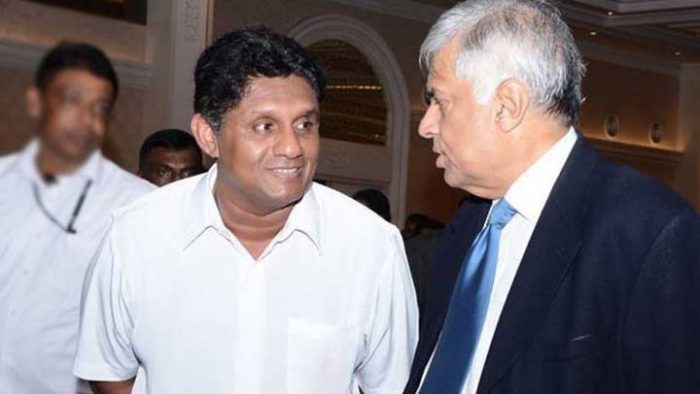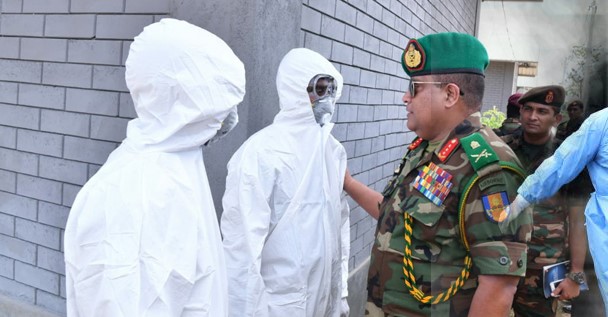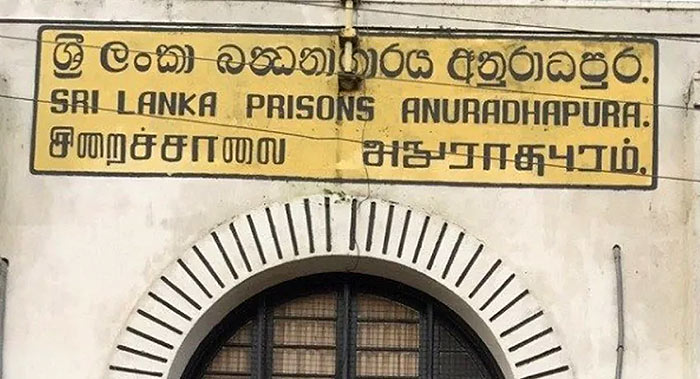(Image courtesy of SL Army)
Health Response
The professional health service in Sri Lanka has managed to overcome the initial pandemic challenges, posed by the Covid-19 coronavirus. The public support for the health response of the government is immense. All political parties extended their support to the measures taken by the Government. However, regular clashes have occurred with defence officials as the government has insisted on a more militarized and less public health-focused approach to the crisis. The main hospital handling identified cases of Covid-19, (National Institute of Infectious Deceases, commonly known as IDH Hospital), is efficiently managed by a well-respected medical and nursing staff, led by Dr. Ananda Wijewickrama.
The clash between medical professionals and the military has spilled into the public eye, with the disappointment expressed by the Government Medical Officers Association (GMOA) as the Government placed the army commander in charge of overall COVID 19 Response. The GMOA, which is traditionally in political lockstep with the President’s political ideology, has openly shown displeasure towards the government. When the nomination lists for the parliamentary elections were finalized, the President’s Sri Lanka Podujana Peramuna (SLPP) party failed to give expected slots for a few key GMOA figures to contest the elections and enter Parliament. The GMOA and Government are now at loggerheads, giving contradictory figures on the number of patients.
The structure of the health response of the Sri Lankan Government was primarily designed to promote the Military and to popularise the Military interventions for future political gains of the President. Prime Minister Mahinda Rajapakse was also sidelined in his efforts to involve opposition parliamentary parties in the response. However, more recently a committee headed by Basil Rajapakse, comprising of, among others, the military leadership is vested with the authority to deal with essential supplies, which can provide major leverage during the forthcoming election. The government has also authorized only certain e-commerce business establishments to give supplies to the general public during the lockdown. Many of these establishments were supporters of the president during the last election, and several of their executives enjoy official positions and perks in the government.
The following appointments to the vital organisations that are handling the coronavirus response are significant:
- While a 22-member National Action Committee has been set up by the Ministry of Health to prevent the spread of coronavirus in Sri Lanka, they were made to involve military officials in key roles.
- Lt. Gen. Shavindra Silva, Army Commander as the head of the main coronavirus response team. He is the Head of National Prevention Centre for COVID 19. This centre is responsible for coordinating and managing measures to ensure healthcare and other services are geared to serve the public.
- Former army commander General Daya Ratnayake, who is the current head of the Ports Authority, declared: “This is a time that belongs to the military… The military must get the upper hand.” He is the head of the Sri Lanka Ports Authority
- Defence secretary Kamal Gunaratne is a long associate of President Rajapakse and played a key role in organising his presidential election campaign. He plays a major role in almost all the key institutions including the Telecommunication Regulatory Commission (as Chairman).
Lack of Legal Framework
In the current situation, the public does not challenge the legality of some of the Government’s actions. However, the Government has not followed any legal framework in its drive against Covid-19 in Sri Lanka. Following are the key lapses:
- The country is under lockdown and under curfew. However, neither lockdown nor curfew has been imposed in terms of any legal provision. Neither Section 16 of the Public Security Ordinance, which permits the imposition of curfew nor any Emergency Regulations have been activated or brought into force. The Constitution mandates that such steps would automatically trigger a summoning of Parliament.
- All measures thus far taken to quarantine people have been based on executive orders without any force of law. Neither the Quarantine and Prevention of Diseases Ordinance nor Contagious Diseases Ordinance, Chapter 555 have been invoked. No regulations have been introduced by the Health Minister introducing any of the provisions relating to the quarantine of the people or vessels. Procedures for handling coronavirus fatalities have not been legally framed.
- The President has approved some financial allocations to be used from the Consolidated Fund under emergency provisions. However, he is unable to meet the huge health cost and urgent economic needs without the approval of the Parliament, which is dissolved. The only legal provision to formalise the expenditure is to obtain parliamentary approval, which requires the President to summon Parliament. The Constitution, under Article 70(7), makes provisions for a dissolved Parliament to be summoned for emergencies for any purpose, which includes passing of appropriations.
SLPP Election Campaign Flouts Social Distancing rules
Social distancing rules are presently strictly implemented with arrests for non-compliance. Several Muslims were arrested for participating in religious services at Horowpathana and this has created a platform among some of the Sinhala Buddhist hardliners to denounce Muslims. However, the Chief Incumbent of Sri Pada Ven. Bengamuwe Dhammadinna, who is also a Chancellor of Wellassa University who violated the directives and called upon Buddhist pilgrims were ignored by the Government. No actions were taken against any Buddhist groups who gather in numbers to go on chanting Pirith in some areas of the country.
Sri Lanka Podujana Peramuna, (SLPP), the political party of the President, continued with its political campaign with impunity. Several meetings organised by them were attended by its leadership including Minister Dullas Alahapperuma, the main campaign strategist of the party. Alahapperuma conducted a series of in-person pocket meetings attended to by party organisers and key campaigners. The police and military ignored their own guidelines and permitted these meetings, also providing security against interruptions. The media has not reported on these events for fear of reprisals. Free movement of SLPP politicians and their supporters is evident in most parts of the country, flouting the curfew with police escort.
Prison Murders – Anuradhapura
Citing the coronavirus threat, Sri Lankan prison authorities imposed a ban on all visitors on March 18. Prisoners in the Anuradhapura Prison were angry over the poor-quality food supplied by the authorities since the bans. Tensions also rose last week inside Kegalle jail after rumours spread that a coronavirus-infected individual had been brought to the prison. On 20th March 2020, the Police Special Task Force was called in and fired live bullets on the protesting prisoners, killing two prisoners and injuring at least eight others.
There is a Trial at Bar pending against law enforcement officers and prison officers in respect of a prison massacre in 2012, during which time President Gotabaya Rajapaksa was serving as the Secretary of Defence. Evidence strongly indicates that the 2012 shooting was authorised by him. After becoming President, Rajapaksa installed the brother of the 1st accused in the 2012 murder as the police officer in charge of that murder investigation team, ensuring that the trial will be botched. Given the current political environment, a reasonable investigation of the recent shooting cannot be expected.
Assault on Criminal Justice System
On 20 December 2000, when eight Internally Displace Refugees, including two minors, returned to inspect their property were arrested by the Army on 19th December 2000 in a village named Mirusuvil close to Jaffna. They were subsequently brutally murdered army soldiers and buried in a mass grave, about 16 miles east of Jaffna town. Subsequently, several military officers, including Staff Sgt. R.M. Sunil Ratnayaka was charged and convicted by a three-judge bench in 2015. Their convictions were affirmed unanimously by a 5-judge bench of the Supreme Court in May 2019. The Supreme Court judge who wrote the ruling, Justice Buwaneka Aluwihare, was appointed to the court by President Mahinda Rajapaksa and is a former Army Judge Advocate. While the country was distracted by the Covid-19 pandemic, the President overruled the recommendation of the courts, Attorney-General and Justice Minister and granted a Presidential Pardon to Sunil Ratnayake, who was released prison. The military escorted him back to his residence and gave him 20 years of back wages as a cash payment (compensation).
This is the only prosecution the Sri Lankan government was able to use to showcase to the international community that Sri Lanka is capable of having an independent judicial inquiry against killings of Tamils using domestic judges. However, President Rajapakse in his campaign pledged that once he becomes President, he would release all military officers who were arrested and charged with any crimes, calling the accusations against them “absurd.”
The government sought to secure bail for accused persons in several high-profile narcotics cases by summoning High Courts to hear their bail applications and encouraging the Attorney-General’s Department to consent to bail. The AG’s department fought these moves. However, the Attorney General consented to the release on bail of the President’s cousin Udayanga Weeratunga, who was extradited from the United Arab Emirates for embezzling $7 million in Sri Lankan government funds in a military procurement when the President served as Defence Secretary.
Meanwhile, the police have reopened the investigation into the Easter Sunday terror attacks in an attempt to target and persecute former police officers. Last week, the government arrested the Muslim manager of a private bus company that had sold a bus ticket to the suicide bomber who struck the Zion church in Batticaloa. He was accused of being the “mastermind” of the Easter attack and the “handler” of the Batticaloa bomber. He had previously been cleared of wrongdoing by detectives and prosecutors working in collaboration with several international law enforcement and intelligence agencies. Immediately after the arrest, the IGP ordered the internal affairs arm of the police, the SIU, to probe whether former CID Director Shani Abeysekara had colluded with or otherwise supported the perpetrators of the Easter attacks, giving wide publicity to this move.
Instead of focusing on Covid-19, government officials at the highest levels remain consumed with exploiting the crisis to pardon murder convicts, bail narcotics dealers and family members, and target and persecute police officers who investigated accusations that the President ran a death squad responsible for several abductions and murders of journalists and other serious abuses during his tenure as defence secretary.
Media Strategies
The government has now taken full control of media, including private media, to popularise the political agenda of the government and strategic direction of a Sinhala Buddhist state. The calculated move is visible through an organised social media strategy of the government politicians as well as control of the dissemination of information. For example, no expert can be invited for any electronic media programme or interview on a private or public channel without the approval of the President or outside the list of the “experts” prepared and cleared by intelligence services. Several of the Sri Lankan experts living in other countries were denied any media interviews by state media and private media run by the businessmen closely associated with the President, because they could not be depended on to praise the government on air.
Two private media institutions (Derana and Hiru) strongly back the President’s media strategy, which is implemented by the state media. Different branches of the military support the media line of the President. This is effectively supported by organised social media networks and volunteers, who associated with the President’s election campaign in November. There is clear evidence that anchorpersons and news directors of Derana and Hiru media institutions, together with their owners, promote racism which would finally strengthen their business ends. These institutions are leading an escalation of Islamaphobia in the Sinhala language electronic and social media streams.
The following key messages that are propagated in the vernacular media, including the websites operated by the pro-government outfits, are
- President has given strong leadership to Sri Lanka, and his leadership is the main reason for “successfully” containing COVID 19
- Military leadership was essential for Sri Lankans to face the challenge. It has also disciplined the society to meet the aspirations of Sri Lankans.
- The government will protect the people of Sri Lanka and avoid starvation
- China is the only country that successfully managed coronavirus and set an example to the world. Being a true friend, China is a true friend of Sri Lanka
- The western world has shown incompetence and the US will be doomed.
- Sri Lankan returnees from the West, particularly from Italy, who have not reported for quarantine are traitors.
Sri Lankans returning from Italy have been subject to severe media attacks. A cabinet minister, Mahindananda Amaraweera, called them traitors. Pubic onion was once created inciting violence against them. Military officers often make menacing speeches against those who even constructively criticise the government’s efforts. Even the police spokesman has used unreliable social media content to attack the government of Italy.
Sri Lankans Seeking to Return From Overseas
The government made it clear that the Sri Lankans who are held up in other countries should remain in the respective countries without attempting to return. There are over 100,000 Sri Lankan students held up in USA, UK, Australia, New Zealand and Japan. Over 1.4 Million foreign workers working mainly in Middle East, on temporary visas. Many of those had sought assistance form Sri Lankan Missions abroad but received dismissive replies. Many Sri Lankans have been subject to abusive responses by consular officers worldwide.
Several Head of Mission posts are presently vacant and managed by inexperienced staff, making it impossible to achieve diplomatic support at this stage from many important countries. Public officials insist that Sri Lankans who seek to return to the country should be away until the coronavirus is eradicated in Sri Lanka. However, Article 14(1) of the Constitution gives all citizens of the country the right to return to Sri Lanka. Sri Lanka has now become the only country which has prevented citizens of their own country from returning to their motherland due to COVID 19.
Though the Airport is closed and Sri Lankan airlines is grounded, arrangements are being made for a chartered Sri Lankan Airlines flight to repatriate the children of few ministers and certain politically powerful individuals to Sri Lanka from Japan, New Zealand and Australia on or around 8 April 2020.
The Political Landscape
The main opposition, UNP, is divided and the majority of the UNP leaders, led by the Sajith Premadasa, formed a new party- Samagi Jana Balawegaya (SJB). Both parties are contesting the forthcoming Parliamentary Elections separately, giving an upper hand to the President’s political party. It is not clear at present the direction of the Tamil and Muslim parties. The President’s party is dominated by the Rajapaksa family and a new set of campaigners. The main focus of the President is to roll back the constitutional reforms introduced by the previous government, which require a 2/3rd majority in parliament. All activities of the government including the battle against coronavirus are calibrated to gain a 2/3rd majority in the forthcoming election. There is no preparation or unity among the opposition, which is weak in all respects. Another clear objective of the election is to ensure entry into parliament of a pro-military and nationalist thinktank so that the President will be defended in the Myanmar type of parliament if required.

The leadership of the UNP, as well as the breakaway group, SJB is strategically aligned with the nationalist line expecting electoral gains and therefore, it tacitly supports the President even in extreme nationalist steps taken by the President. They have also failed to defend the major pro-democratic achievements made by the previous government including defending the courageous and independent police officers, but defended the military chief, all times, who were accused of war crimes.
Most of the major political parties have called for reconvening dissolved parliament, which is permissible under the Constitution, but the Government has declined the request. The two apparent reasons are (a) the government wants to thwart any parliamentary debate on the militarization of the Health Response by the President and (b) to deprive opposing viewpoints of media attention at a time when the media is kept under tight control. Though the government does not say the reasons for not convening the parliament, one of its think tank leaders and national list aspirant Gevindu Kumaratunga said repeatedly that requests made by the opposition to reconvene Parliament in the face of the Covid-19 outbreak are hilarious as Parliament failed to avert the Easter Sunday attacks which claimed over 300 lives.
Read the STATUS STATEMENT I: 20-03-2020 , Sri Lanka’s Response to COVID-19 as a PDF:Sri Lanka’s response to Covid 1 – AIP



